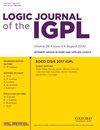The fixed points of belief and knowledge
IF 0.8
4区 数学
Q2 LOGIC
引用次数: 2
Abstract
Self-referential sentences have troubled our understanding of language for centuries. The most famous self-referential sentence is probably the Liar, a sentence that says of itself that it is false. The Liar Paradox has encouraged many philosophers to establish theories of truth that manage to give a proper account of the truth predicate in a formal language. Kripke’s Fixed Point Theory from 1975 is one famous example of such a formal theory of truth that aims at giving a plausible notion of truth by allowing truth value gaps. However, not only the concept of truth gives rise to paradoxes. A syntactical treatment of epistemic notions like belief and knowledge leads to contradictions that very much resemble the Liar Paradox. Therefore, it seems to be fruitful to apply the established theories of truth to epistemic concepts. In this paper, I will present one such attempt of solving the epistemic paradoxes: I adapt Kripke’s Fixed Point Theory and interpret truth, knowledge and belief within the framework of a partial logic. Thereby I find not only the fixed point of truth but also the fixed points of knowledge and belief. In this fixed point, the predicates of truth, belief and knowledge find their definite interpretation and the paradoxes are avoided.信念和知识的固定点
几个世纪以来,自指句子一直困扰着我们对语言的理解。最著名的自我指称句可能是“骗子”,这句话本身就说它是假的。骗子悖论鼓励许多哲学家建立真理理论,设法在形式语言中正确地解释真理谓词。克里普克1975年的不动点理论是一个著名的例子,它是一种形式的真理理论,旨在通过允许真理价值差距来给出一个合理的真理概念。然而,不仅真理的概念会产生悖论。对信仰和知识等认知概念的句法处理会导致非常类似于骗子悖论的矛盾。因此,将已建立的真理理论应用于认识概念似乎是富有成效的。在本文中,我将提出一种解决认识悖论的尝试:我改编了克里普克的不动点理论,并在偏逻辑的框架内解释真理、知识和信仰。因此,我不仅找到了真理的固定点,而且找到了知识和信仰的固定点。在这个固定点上,真理、信仰和知识的谓词得到了明确的解释,悖论得以避免。
本文章由计算机程序翻译,如有差异,请以英文原文为准。
求助全文
约1分钟内获得全文
求助全文
来源期刊
CiteScore
2.60
自引率
10.00%
发文量
76
审稿时长
6-12 weeks
期刊介绍:
Logic Journal of the IGPL publishes papers in all areas of pure and applied logic, including pure logical systems, proof theory, model theory, recursion theory, type theory, nonclassical logics, nonmonotonic logic, numerical and uncertainty reasoning, logic and AI, foundations of logic programming, logic and computation, logic and language, and logic engineering.
Logic Journal of the IGPL is published under licence from Professor Dov Gabbay as owner of the journal.

 求助内容:
求助内容: 应助结果提醒方式:
应助结果提醒方式:


